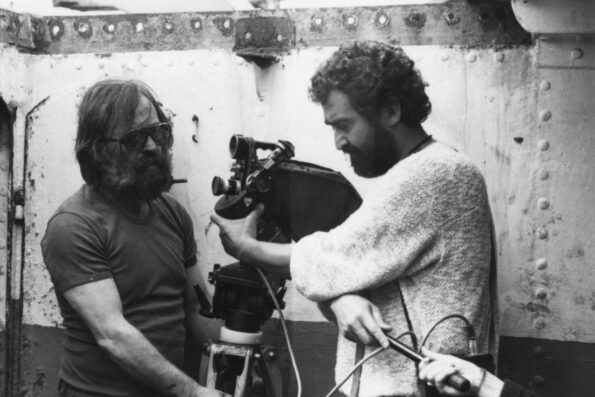Search
To search for an exact match, type the word or phrase you want in quotation marks.
A*DESK has been offering since 2002 contents about criticism and contemporary art. A*DESK has become consolidated thanks to all those who have believed in the project, all those who have followed us, debating, participating and collaborating. Many people have collaborated with A*DESK, and continue to do so. Their efforts, knowledge and belief in the project are what make it grow internationally. At A*DESK we have also generated work for over one hundred professionals in culture, from small collaborations with reviews and classes, to more prolonged and intense collaborations.
At A*DESK we believe in the need for free and universal access to culture and knowledge. We want to carry on being independent, remaining open to more ideas and opinions. If you believe in A*DESK, we need your backing to be able to continue. You can now participate in the project by supporting it. You can choose how much you want to contribute to the project.
You can decide how much you want to bring to the project.

In today’s film industry, various distribution methods determine a movie’s trajectory. On one side, there are commercial productions with massive budgets and global marketing campaigns, launched simultaneously in theaters worldwide. On the other, we find films that debut at festivals and, if fortunate, make their way into commercial cinemas and streaming platforms, reaching broader audiences. However, some films remain confined to the festival circuit, where their true value lies in artistic recognition and critical acclaim.
In this context, film critiques—unlike art critiques—possess a timeless quality: they are written with the intention of helping the movie find its audience, generating interest, and motivating viewers to discover and enjoy it. Thus, cinema becomes a space for reflection and dissemination that transcends box office numbers and immediate consumption. Despite the 31st edition of L’Alternativa concluding on November 24, the festival will continue to have a presence on Filmin from January 20 to February 2 and offers free content on YouTube, broadening its reach.
To extend the conversation about the films presented in this edition, I will discuss three works that, on the surface, appear unrelated but intertwine and intersect for me, connecting at times deeply personal and at others universally resonant points. Las novias del sur, Grand Tour, and Caja de resistencia explore intergenerational relationships, personal bonds in tension with social and political expectations, and cultural resistance while challenging the boundaries of conventional storytelling. In this dialogue between auteur cinema and experimentation, we can trace echoes of cult directors like Chantal Akerman or Jean-Luc Godard, whose work also delves into the intricate interplay between individuals and history, memory and escape.
Las novias del sur: Memory, Feminism, and Escape
In the documentary medium-length film Las novias del sur, Elena López Riera presents a reflection on women from the south who, through discussing their past relationships and sexuality, delve into the weight of memory and legacy. Through their stories, these women confront the question of how their personal histories intertwine with the social structures that shape them. This approach recalls the work of Chantal Akerman in films like Jeanne Dielman, where the repetition of daily actions becomes an act of resistance against the invisibilization of women in patriarchal society.
Las novias del sur also portrays how women confront a history that is both personal and collective, shaped by relationships that define yet also constrain them. The narrative is interwoven with the director’s own voice, reconstructing each story through her personal experience, drawing a feminine genealogy that culminates in her non-motherhood.
As a woman born in Andalusia, Las novias del sur reflects my experiences through the director’s lens. It is a delicate memory of the women who precede us, whose stories of love, motherhood, and renunciation become an invisible legacy, a silent echo that does not pass on to the next generation.
Grand Tour: Escaping Relationships, Visual Memory, and Narrative Experimentation
Miguel Gomes’ feature film Grand Tour elevates the concept of escape to a more explicit level, where relationships not only fade but distort in a dance between past and present. The story of Edward and his fiancée Molly is one of fleeing an unfulfilled love, reminiscent of Godard’s Pierrot le Fou, where desire and escape are in constant negotiation.
However, the flight in Grand Tour is not only emotional but also a reflection on how cinema can mirror the fragmentation of time and space. Gomes crafts a dual narrative oscillating between historical recreations and documentary moments, forming a kind of distorted mirror of cinematic history.
Caja de resistencia: Archives, Cultural Resistance, and Lost Memory
Caja de resistencia, the winner of the Best National Feature award at L’Alternativa 2024, dives into the realm of memory and archives as acts of political resistance. Directors Concha Barquero Artés and Alejandro Alvarado Jódar revisit the legacy of Fernando Ruiz Vergara, an Andalusian filmmaker who faced censorship during the early years of Spanish democracy. The film recovers Ruiz Vergara’s unrealized projects as a form of cultural resistance.
Like Jean-Marie Straub and Danièle Huillet in Chronicle of Anna Magdalena Bach, Barquero and Alvarado play with temporal distortion and historical reconstruction. In doing so, Caja de resistencia creates a dialogue between recent past and present politics. Ruiz Vergara’s memory, buried by censorship, reemerges in this film as a testament to the struggle against authoritarian structures that seek to erase disident voices.
This film’s recognition not only highlights the work of Andalusian filmmakers but also underscores cinema’s importance as a space for political resistance against dominant narratives. In a time of increasing representation crises, the archive becomes a mechanism of subversion, an act of reclaiming historical memory that resists disappearance.
These three films connect through their exploration of human relationships and their shared critical approach to the memories and escapes that shape our personal and collective histories. In a moment where political and cultural resistance is increasingly necessary, contemporary cinema emerges as a space where silenced voices—whether by patriarchy, censorship, or oblivion—can be recovered and reimagined. Through films like Las novias del sur, Grand Tour, and Caja de resistencia, cinema demonstrates its power as a vehicle for dismantling dominant narratives and opening new doors to memory, relationships, and struggles for recognition.
(Cover Image: Still from the film Caja de resistencia by Concha Barquero Artés and Alejandro Alvarado Jódar)

Staffan Folcker is a cultural agent based in Istanbul. His work is articulated around cinema as a tool for reading the city, in dialogue with its layered histories and contemporary scene. In this context, local screenings and everyday rhythms merge into a single narrative —one shaped by place, memory, and collective viewing.

María Muñoz-Martínez is a cultural worker and educator trained in Art History and Telecommunications Engineering, this hybridity is part of her nature. She has taught “Art History of the first half of the 20th century” at ESDI and currently teaches the subject “Art in the global context” in the Master of Cultural Management IL3 at the University of Barcelona. In addition, while living between Berlin and Barcelona, she is a regular contributor to different media, writing about art and culture and emphasising the confluence between art, society/politics and technology. She is passionate about the moving image, electronically generated music and digital media.
Portrait: Sebastian Busse
"A desk is a dangerous place from which to watch the world" (John Le Carré)